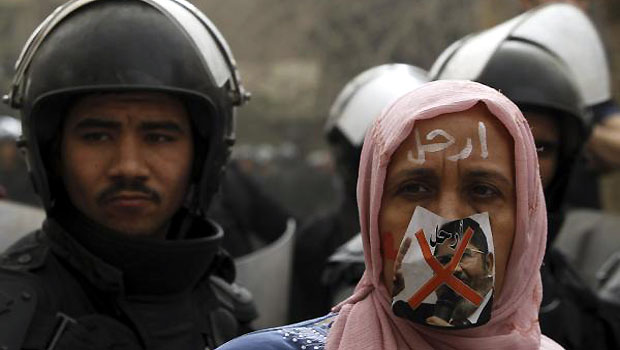The new Egyptian constitution, a worrying document for women, journalists and religious minorities alike, was the tipping point for many of those observers that still granted the Ikhwan the benefit of the doubt. After Mohammed Mursi’s signature in late December, which made the constitution legally binding, a flurry of criticism was directed at the Egyptian president and Muslim Brotherhood leaders. They were accused of building an image of moderation and rationality while they waited patiently for their turn at the helm of Egyptian politics, only to then drop that coat and reveal their real autocratic ambitions.
Beyond the Brotherhood’s clumsy inability (some would say unwillingness) to generate consensus on key matters such as the new constitution and the date for the parliamentary elections, some of this criticism is well placed. Take, for example, the Brotherhood’s focus on petty politics such as alcohol consumption—a concession to Al-Nour, the Brotherhood’s Salafist allies—while a mounting budget deficit and food and energy shortages are not being addressed conveniently.
That Brotherhood leaders seem to be worried about making sure they remain in power above anything else is a persuasive argument. It is equally hard to dispute that they have prioritized group allegiance over experience and ability when it comes to appointments for important government positions. The always-present rumor of an imminent intervention by the army to avert an impending catastrophe attests to the poor record of Mursi and the Brotherhood so far, however unlikely such intervention might be.
Yet if the Brotherhood can be accused of committing some high-profile mistakes, what can be made of the secular opposition’s stance so far? In particular, how can one interpret their decision to boycott the forthcoming, but as yet unscheduled, parliamentary elections?
Less than forty-eight hours after Mursi issued the decree calling for the election, Mohamed El-Baredei, a former would-be presidential candidate, tweeted a call for an opposition boycott, apparently without even consulting with other opposition leaders.
Other well-known opposition leaders have made no secret of the fact that this decision aims to avoid a further legitimization of Mursi and the Freedom and Justice Party. Their words are clear, even if their intention might have been to smooth things a bit after Baradei’s precipitous move. Speaking to Asharq Al-Awsat recently, Ahmad Al-Bur’i, a leader of the National Salvation Front (NSF), justified the election boycott with the opposition’s feeling “that the rule of law in Egypt is absent,” and that the security and economic problems are too great to hold another election soon.
Another leading NSF figure, Amr Mousa, told Asharq Al-Awsat a few weeks ago that he was considering boycotting the parliamentary elections because of a disagreement with Mursi’s policies, although he acknowledged that the president was democratically elected. “We do not challenge the fact that the president was elected democratically, and that he is the president. But we differ with his choices. This is our right as citizens,” he said. “My personal preference when it comes to elections is always to run and to join in the electoral process, but Egypt is going through special circumstances, most of them negative. The priorities are confused,” he added.
Since the ousting of Mubarak, every ballot held in Egypt—save the presidential election—has given the Islamists comfortable victories. The popular approval of the constitution was another such case. However, the forthcoming elections could reverse this tendency. There are reports that former members of the Brotherhood are so disappointed with the organization that they are open to an alliance with the secular opposition parties. Mursi’s popularity has also plummeted in universities. The Islamists are still clear favorites, but it is the failure of the opposition to play constructive politics and capitalize on Mursi’s growing unpopularity in the ballot box that can deliver the Islamists yet another landslide victory.
The opposition parties are right to have serious reservations about Mursi and the Brotherhood’s record so far. But beyond more street protests, arrests and instability, it is hard to envision what NSF leaders hope to gain from the election boycott, the constant refusal to dialogue with the government, and their implicit support for civil disobedience.
There are other, possibly graver, long-term consequences of this confrontational option. By declining to participate in the parliamentary elections, the secular opposition might be delivering the death blow to the democratic path that the majority of Egyptians chose. The implicit message behind this boycotting policy is simple: they only support democracy and elections if the outcome is likely to favor them.
The Egyptian political scene is still haunted by the lack of a democratic political culture. This is clearly reflected within both government and the opposition. The latter claim to have alternative, constructive plans for the future of Egypt; yet so far, they have adopted populist policies and proved to be a very fractioned crowd.
To wait until Mursi and the Brotherhood shoot themselves in the foot or for another uprising to overthrow Mursi and the Freedom and Justice Party is not a responsible strategy. Egypt and its economy cannot sustain a return to the recent past. It is also unreasonable (not to mention contrary to the ideals of the revolution) to refer to a potential intervention by the army as a possibility with no serious strings attached, as some opposition leaders have suggested.
A Pew Poll from last year, conveniently re-published on the Brotherhood’s official English-language website, revealed that 66% of Egyptians believed that Islam should play a major role in public life. The Egyptian opposition should take heed of this fact. Tahrir Square protesters are not representative of the majority of Egyptians. Before thinking of ruling Egypt, the Egyptian opposition should first prove to be a credible alternative within the rules of the game, even if these are shaped by the Brotherhood.
